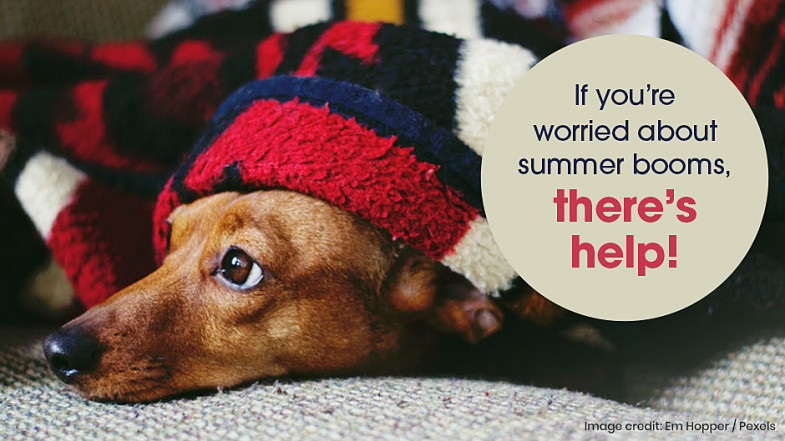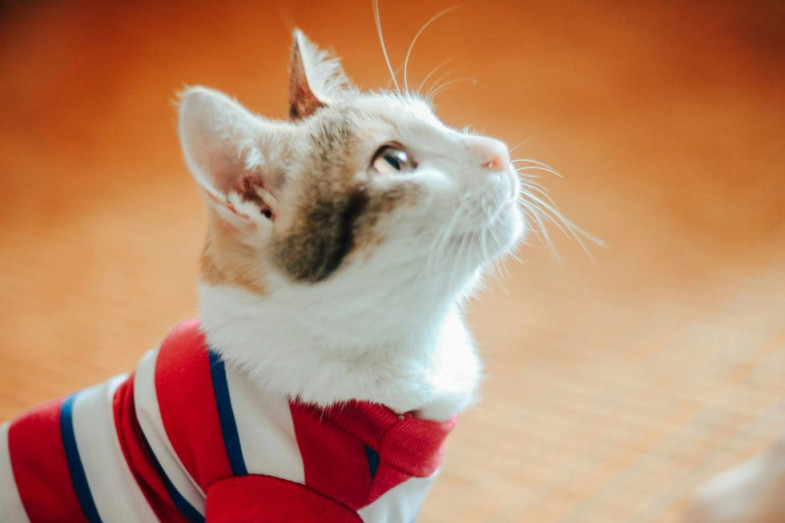Steckelberg Vet Clinic Blog
If You’re Worried About Summer Booms, There’s Help!

Does your dog have a fear of thunderstorms or fireworks? Many pets are scared of sudden loud noises and experience various symptoms due to their noise aversion. Unfortunately, thunderstorms and fireworks shows often occur more frequently during the summer months and can cause increased anxiety in your pet.
Luckily, there are ways to ease your pet’s fears, and we are here to help! Here are a few ways you can help your pet now and make sure they are prepared for the upcoming season.
Be Prepared
The first step in being prepared for summer booms is identifying your pet’s problem and creating a plan. The most common signs of a noise aversion include:
- Hiding
- Shaking
- Increased Vocalization
- House Soiling
- Destructive Behavior
- Attempts to Escape
If your pet is experiencing any of these symptoms during a noise event, it’s essential to take your pet’s condition seriously and look for ways to help. Failure to do so can seriously affect your pet’s well-being and even lead to injury.
Start by looking at your upcoming weather forecast or local events that may include fireworks. This can help you predict when these summer booms are most likely to occur and when you should start preparing your pet.
Don’t Wait!
While you may not be able to predict every boom, it’s better to be proactive in your efforts to keep your pet calm. Before an event occurs, try to set up a safe space away from windows and doors where your pet is less likely to hear any outside noise. Turning on some music or a sound machine can also be a great way to distract your pet and drown out any scary sounds.
Once your pet gets scared, it can be difficult to calm them down, and your efforts may not be as successful. Instead, take steps to calm your pet before the event occurs.
Talk to Us About a Calming Agent
In severe cases of noise aversion, calming agents can help reduce your pet’s anxiety and keep your pet safe.
If you think your pet would benefit from a calming agent, let us know as soon as possible. Don’t wait until the Fourth of July to get your pet the help they need. Set up an appointment ahead of time to discuss your pet’s condition. Our team is happy to make recommendations based on your pet’s unique needs.
Keep in mind that it may take some time to find the medication or dose that works best for your pet. Additionally, these calming agents must be given in advance of the noise event to provide the most benefit for your pet.
Final Thoughts
If your pet struggles with a fear of loud noises, the time to act is now! There are a variety of ways you can help your pet. However, it’s essential to take action soon and avoid waiting until it’s too late.
For more information about calming agents and other ways you can help reduce your pet’s fears, please give us a call. We look forward to hearing from your and helping your pet fight their noise fears!
Categories
Recent Posts

February is often associated with love, thanks to Valentine’s Day, and that makes it a perfect time to show extra care to the pets who mean so much to us. While treats and cuddles are always appreciated, one of the most meaningful ways to support your pet is by focusing on their health from the inside out. Dental health and heart health may seem like separate topics, but they are closely connected and both play a major role in your pet’s overall wellness.

When was the last time your pet saw the veterinarian for a checkup, not because they were sick, but just to stay healthy? Preventive care is one of the most important ways to give your pet a longer, happier life. It’s not about doing one big thing. It’s about the small, consistent steps that help avoid bigger health problems later on.

The holidays are full of sparkle, laughter, travel, and to-do lists a mile long. As joyful as this season can be, it often means busier schedules and less time for everyday routines. In the middle of the holiday rush, it's easy to overlook one very important family member: your pet.